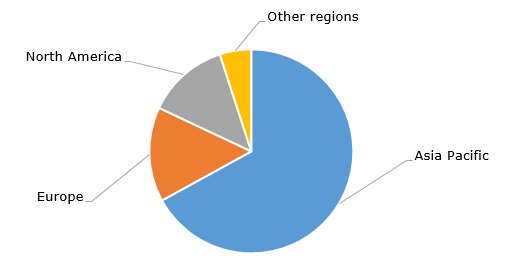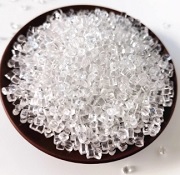Polymethyl methacrylate (PMMA, acrylic glass) is a thermoplastic polymer obtained via radical chain-growth polymerization of methyl methacrylate (MMA) monomer. It can be represented by copolymers of MMA with acrylonitrile, styrene, α-methyl styrene, and acrylic esters. In combination with quartz or limestone used as fillers, PMMA can form artificial marble. PMMA is a brittle material, yet it demonstrates excellent parameters of hardness, transparency, chemical resistance, weatherability, colour versatility, and processing variability. The latter means that it can be extruded, injection moulded, thermoformed, and welded. Polymethyl methacrylate is used to make automobile parts, optical media, flat panel displays, stomatology materials, orthopaedic devices, shower facilities, glazing, traffic signs, spectacles, watch glasses, interior design items, and a wide range of other products. During the Covid-19 pandemic polymethyl methacrylate was commonly applied to manufacture anti-Covid plastic barriers, which boosted PMMA consumption.
Popular PMMA trademarks are owned by Röhm GmbH, which distributes its PMMA products under the PLEXIGLAS trademark in Europe, Asia, Africa, and Australia and under the ACRYLITE trademark in the Americas. Both trademarks feature the whole portfolio of PMMA products for various application areas. Interesting products are marketed by Röhm under the DEGALAN trademark (formerly owned by Evonik Industries). In 2023, Röhm launched DEGALAN proTerra, which is partially made from recycled PMMA, which conforms to circular economy principles and reduces carbon footprint. In 2019, Röhm was carved out from Evonik Industries after the latter was acquired by a global private equity investor firm, Advent International. Therefore, Röhm carries on its P/MMA business as an independent company. Other major PMMA trademarks include Altuglas (Trinseo; the trademark was formerly owned by Arkema), Crylux/Perspex (both owned by 3A Composites Display Europe), and Lucite/Diakon (both owned by Lucite International).
Polymethyl methacrylate: structure of the global consumption by region, 2023

The current global PMMA production exceeds 2.4 mln tonnes per year. The PMMA consumption worldwide is dominated by Asia Pacific. The global polymethyl methacrylate market value is expected to reach USD12 bn by 2027, demonstrating an annual growth rate of 2-3% in the near future. However, the year 2023 was a difficult period for the PMMA market. For example, Trinseo, a US-headquartered specialty material solutions provider, recorded a decrease in PMMA sales in various applications, specifically wellness and consumer electronics applications. In September 2023, Röhm GmbH increased the price for its PMMA-based film products by 23% for the regions of Europe, Asia Pacific, and Africa. The increase was driven by unfavourable macroeconomic environment.
Find a detailed analysis of the global PMMA market in the in-demand research report “Polymethyl Methacrylate (PMMA): 2023 World Market Outlook and Forecast up to 2032”.
